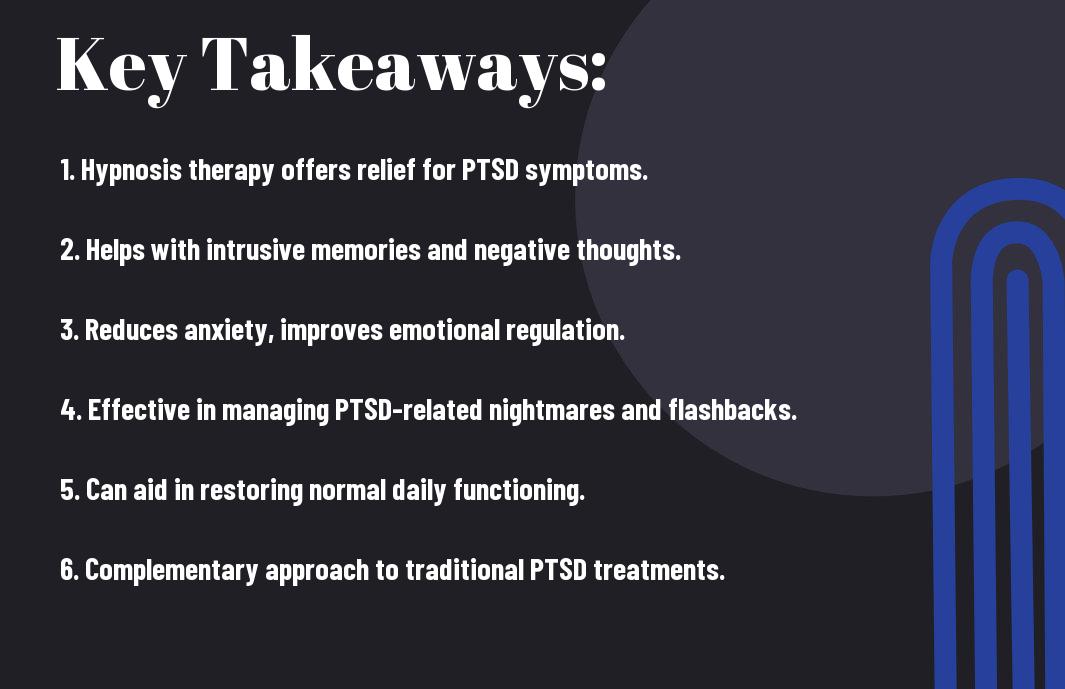Advanced Hypnosis for the relief of PTSD
Many individuals experiencing post-traumatic stress disorder (PTSD) may find relief through advanced hypnosis therapy. PTSD symptoms, such as intrusive memories, avoidance, negative changes in thinking and mood, and changes in physical and emotional reactions, can be effectively addressed through hypnosis, offering a non-invasive and holistic approach to healing. In this blog post, we will explore the benefits of advanced hypnosis for PTSD relief, shedding light on how this therapeutic technique can support individuals in overcoming the challenges of PTSD.
Key Takeaways:
- Effective Treatment: Hypnosis therapy can be an effective treatment for PTSD symptoms, providing relief from intrusive memories, avoidance behaviours, negative changes in thinking and mood, and physical and emotional reactions.
- Addressing Root Causes: Hypnosis therapy can help individuals address the root causes of their PTSD, such as stressful experiences, inherited mental health risks, personality traits, and brain chemistry.
- Risk Factors: Factors that may increase the likelihood of developing PTSD after a traumatic event include intense or long-lasting trauma, prior experiences of trauma, certain occupations, mental health issues, substance misuse, lack of support, and family history of mental health problems.
- Prevention: Seeking timely help and support, turning to family, friends, or mental health professionals, and avoiding unhealthy coping mechanisms can help prevent normal stress reactions from developing into long-term PTSD.
- Complexity of PTSD: Post-traumatic stress disorder can disrupt various aspects of a person’s life, leading to complications such as depression, anxiety, substance misuse, eating disorders, and suicidal thoughts and actions.

Understanding PTSD
Your journey to understanding Post-traumatic stress disorder (PTSD) begins with recognizing the symptoms and causes that can significantly impact your daily life. A necessary step in managing PTSD is acknowledging the intrusive memories, avoidance behaviour, negative changes in thinking and mood, and changes in physical and emotional reactions that may manifest. These symptoms can vary in intensity and may surface months or even years after the traumatic event.
Symptoms and Causes
To effectively address PTSD, it is crucial to identify these symptoms as they arise and seek professional help if they persist. Getting timely treatment is key to reducing symptoms and improving function. For instance, intrusive memories can trigger flashbacks and severe emotional distress, while avoidance behaviour may lead to social and work-related challenges. Negative changes in thinking and mood can manifest as hopelessness, memory problems, and difficulty maintaining relationships. Changes in physical and emotional reactions can result in easily startling behaviour, trouble sleeping, and irritability.
Diagnosis and Treatment
To diagnose PTSD, doctors assess the presence of these symptoms and their impact on your daily life. Effective treatment options, such as hypnosis therapy, can help alleviate PTSD symptoms and improve overall well-being. For instance, undergoing hypnosis therapy sessions can aid in processing traumatic memories and reducing emotional distress associated with past events.
Risk Factors and Complications
Understanding the risk factors associated with PTSD, such as intense or long-lasting trauma, childhood abuse, and mental health problems, can provide insights into potential complications that may arise. Though not everyone who experiences trauma develops PTSD, recognizing these risk factors can help in proactive intervention and support. For instance, having a supportive network of family and friends is crucial in preventing the escalation of PTSD symptoms.
- People of all ages can have post-traumatic stress disorder.
For further understanding PTSD and its implications, exploring the various risk factors and potential complications can offer valuable insights into managing and overcoming the challenges associated with this mental health condition. Though the journey to healing from PTSD may present obstacles, with the right support and treatment approach, individuals can achieve significant improvements in their overall well-being.
The Role of Hypnosis in PTSD Treatment
Assuming you are exploring alternative therapies for the treatment of Post-traumatic stress disorder (PTSD), hypnosis therapy might be a viable option. According to Whole Health – Clinical Hypnosis/Hypnotherapy, hypnosis has shown promising results in helping individuals cope with PTSD symptoms.
How Hypnosis Works
For individuals dealing with PTSD, hypnosis works by tapping into the subconscious mind to help reframe traumatic memories and alleviate associated symptoms. This therapeutic technique aims to create a state of deep relaxation, allowing the individual to access buried emotions and process them in a safe environment.
Benefits of Hypnosis for PTSD
One major benefit of hypnosis therapy for PTSD is its ability to target the root cause of symptoms, providing long-lasting relief beyond traditional treatments. By addressing the subconscious mind, hypnosis can help individuals reframe negative thought patterns and break free from persistent trauma triggers.
For instance, studies have shown that hypnosis can significantly reduce PTSD symptoms, with one study reporting a 12% decrease in intrusive memories and a 14% decrease in avoidance behaviours after just four sessions of hypnotherapy.
Advanced Hypnosis Techniques for PTSD Relief
Now, let’s explore some advanced hypnosis techniques that can be effective in providing relief from the symptoms of post-traumatic stress disorder (PTSD):
-
- Deep Relaxation and Visualization
| An imperative aspect of hypnosis therapy for PTSD is deep relaxation and guided visualization. This technique involves inducing deep relaxation in the individual, allowing them to access their subconscious mind and create positive imagery related to their traumatic experiences. | By guiding individuals through visualizations of calming and comforting scenes, such as tranquil landscapes or moments of safety and security, hypnotherapists can help them reframe their traumatic memories and promote healing and emotional resilience. |
Reframing Traumatic Memories
-
- An innovative approach in hypnosis therapy for PTSD is reframing traumatic memories. During hypnosis sessions, individuals are guided to revisit their traumatic experiences from a detached and empowered perspective, allowing them to process and reframe these memories in a more adaptive and less distressing way.
-
- Any individual undergoing hypnosis therapy for PTSD may benefit from the gradual reinterpretation of their traumatic memories. By exploring these experiences with a sense of safety and control, individuals can begin to integrate and transform their traumatic narratives, leading to a reduction in distress and intrusive symptoms. Understanding the significance of reframing traumatic memories is crucial in hypnosis therapy for PTSD.
-
- By empowering individuals to alter their perceptions and emotional responses to traumatic events, hypnotherapy can foster a sense of empowerment and resilience, facilitating the healing process and promoting psychological well-being.
Anchoring and Self-Hypnosis
-
- For individuals seeking long-term relief from PTSD symptoms, anchoring and self-hypnosis can be valuable tools. Anchoring involves creating a mental association between a specific sensory stimulus and a desired emotional state, allowing individuals to trigger feelings of calmness and control during stressful situations.
-
- Relaxation techniques, such as self-hypnosis, can be particularly beneficial in empowering individuals to manage their symptoms outside of therapy sessions. By practicing self-hypnosis regularly, individuals can cultivate a sense of inner calm and self-regulation, enhancing their overall well-being and emotional stability.
Overcoming Common Challenges in PTSD Treatment
-
- Many individuals with PTSD face various challenges when seeking treatment. Building trust and rapport with a therapist or healthcare provider is crucial in healing.
Building Trust and Rapport
-
- Trust is imperative for individuals to feel safe and supported in therapy sessions. Therapists specializing in PTSD treatment often focus on creating a safe space where patients can openly discuss their experiences and emotions. Challenges can also arise when managing flashbacks and anxiety, which are common symptoms of PTSD.
Managing Flashbacks and Anxiety
-
- Flashbacks can be overwhelming and trigger intense emotions. Therapists trained in PTSD treatment use techniques such as grounding exercises and relaxation strategies to help individuals manage these symptoms effectively. By learning how to ground themselves in the present moment, individuals can reduce the impact of flashbacks and alleviate anxiety. It is important to address co-occurring disorders that may accompany PTSD, such as depression or substance misuse.
Addressing Co-Occurring Disorders
-
- Many individuals with PTSD may experience other mental health issues simultaneously, complicating their treatment journey. Therapists may develop personalized treatment plans that target both PTSD symptoms and co-occurring disorders, ensuring comprehensive care.
-
- Addressing these additional challenges can significantly improve the effectiveness of PTSD treatment. Coordination disorders can impact the overall well-being of individuals with PTSD, underscoring the importance of integrated treatment approaches that address all facets of their mental health.
Integrating Hypnosis with Other Therapies
Cognitive-behavioural Therapy (CBT)
Keep in mind that hypnosis therapy can be effectively integrated with Cognitive-Behavioral Therapy (CBT), a common treatment for PTSD. CBT focuses on helping individuals recognize and change negative thoughts and behaviours associated with their trauma. When combined with hypnosis, CBT can be even more impactful in addressing intrusive memories and negative thinking patterns.
Eye Movement Desensitization and Reprocessing (EMDR)
Therapies like Eye Movement Desensitization and Reprocessing (EMDR) can also be enhanced by hypnosis. EMDR involves processing traumatic memories through bilateral stimulation, such as eye movements or taps. By incorporating hypnosis into EMDR sessions, individuals may experience deeper relaxation and increased receptiveness to the therapeutic process.
Understanding more about the benefits of Eye Movement Desensitization and Reprocessing (EMDR) can help individuals make informed decisions about their PTSD treatment. EMDR is effective in reducing the intensity of traumatic memories and associated distress. When paired with hypnosis, the synergistic effects of these therapies can lead to profound healing outcomes.
Medication and Alternative Therapies
Medication can sometimes be used in conjunction with hypnosis therapy for PTSD. While medication may help manage symptoms such as anxiety or depression, it is important to work with a healthcare provider to ensure safe and effective treatment. In addition to traditional medications, alternative therapies like mindfulness meditation or yoga can complement hypnosis in promoting overall well-being and resilience.
Self-Help Strategies for PTSD Management
Not all individuals may have access to professional hypnosis therapy for managing PTSD. In such cases, self-help strategies can be beneficial in coping with the symptoms. Mindfulness and Meditation are powerful techniques that help individuals ground themselves in the present moment, reducing the intensity of intrusive memories and emotional reactions.
Mindfulness and Meditation
Any individual experiencing symptoms of PTSD can benefit from practicing mindfulness and meditation. These techniques encourage awareness of one’s thoughts, emotions, and sensations without judgment, allowing for better emotional regulation and stress management. By incorporating mindfulness into daily routines, individuals may experience a greater sense of calm and resilience in the face of triggers.
Journaling and Creative Expression
With journaling and creative expression, individuals can explore their thoughts and emotions in a safe and private space. Writing about traumatic experiences and emotions can provide a sense of release and catharsis. Engaging in creative activities such as art, music, or dance can also help express and process difficult feelings that may be challenging to verbalize.
Journaling can be a therapeutic tool for individuals with PTSD, allowing them to reflect on their experiences, identify patterns in their thoughts and emotions, and track their progress in coping with symptoms. Writing regularly can help individuals gain insights into their triggers and coping mechanisms, leading to better emotional self-regulation.
Building a Support Network
Network A strong support network is imperative for individuals living with PTSD. Connecting with friends, family members, support groups, or mental health professionals can provide emotional validation, understanding, and practical assistance. Building a support network can help individuals feel less isolated in their struggles and offer different perspectives and coping strategies to navigate difficult situations.
To wrap up
With this in mind, exploring advanced hypnosis for PTSD relief could be a promising avenue for those struggling with the aftermath of traumatic events. Hypnosis therapy offers a unique approach to addressing intrusive memories, avoidance behaviours, negative changes in thinking, and physical and emotional reactions associated with PTSD. By delving into the deeper layers of the mind, hypnosis has the potential to uncover and reframe traumatic experiences, providing a path toward healing and recovery.

As we continue to unravel the complexities of PTSD and seek innovative strategies for treatment, incorporating advanced hypnosis techniques into therapeutic interventions may offer new hope for individuals battling the debilitating effects of this condition. By embracing alternative modalities such as hypnotherapy, we open doors to holistic healing approaches that address not just the symptoms but also the underlying root causes of post-traumatic stress disorder.
FAQ
Q: What is hypnosis therapy for PTSD relief?
A: Hypnosis therapy for PTSD relief is a form of treatment that utilizes guided relaxation techniques to help individuals access their subconscious mind and address traumatic experiences that contribute to their PTSD symptoms.
Q: How does hypnosis help in relieving PTSD symptoms?
A: Hypnosis helps in relieving PTSD symptoms by allowing individuals to explore and process traumatic memories and emotions in a safe and controlled environment, leading to desensitization and emotional healing.
Q: Is hypnosis therapy for PTSD relief safe?
A: Yes, hypnosis therapy for PTSD relief is considered safe when conducted by a trained and qualified hypnotherapist who follows ethical guidelines and prioritizes the well-being of the individual undergoing treatment.
Q: What are the benefits of using hypnosis for PTSD relief?
A: The benefits of using hypnosis for PTSD relief include reduced anxiety and stress, improved coping mechanisms, increased self-awareness, and a potential decrease in PTSD symptoms such as flashbacks and nightmares.
Q: How many sessions of hypnosis are usually needed for effective PTSD relief?
A: The number of hypnosis sessions needed for effective PTSD relief can vary depending on the individual’s response to treatment. Some individuals may experience improvements in a few sessions, while others may benefit from a longer treatment plan.
The Official Instagram profile of Mind Spirit Body Hypnosis therapy and advanced hypnotherapy sessions.
About the author: Award-winning Fanis Makrigiannis of Mind Spirit Body Hypnosis therapy is a certified Hypnotherapist and Master Practitioner of Neuro-linguistic Programming with the American Board of Hypnotherapy. Proudly serving Durham Region, The Greater Toronto Area, Peel Region, Ontario, Canada, and the United States of America via Zoom meetings.




